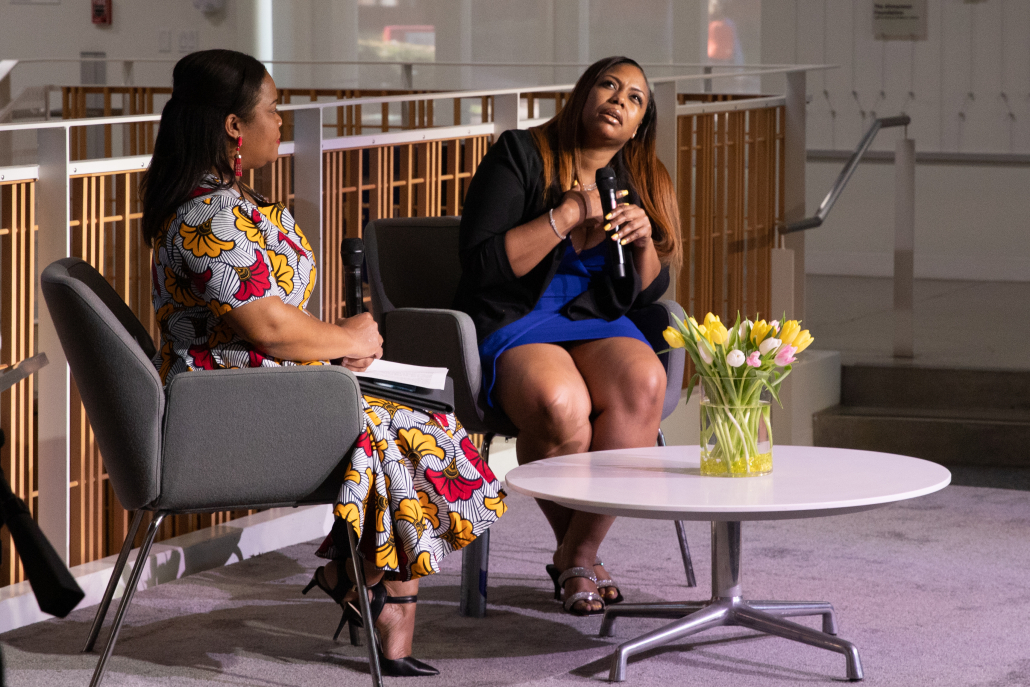Rodney King’s daughter is Bass Lab’s first AI

The Charlotta Bass Journalism and Justice Lab launched at a panel Tuesday at the Forum in Wallis Annenberg Hall, with an unveiling of the Lab’s first virtual human: Lora King, daughter of Rodney King.
The Bass Lab, first conceived in 2020 in partnership with the USC Libraries Digital Repository, focuses on curating and preserving historical Black perspectives and stories through video interviews and AI technology.
“When I started to think of this idea, John Lewis passed away and C.T. Vivian [a Baptist minister and close friend of Martin Luther King] passed the very same day; and I thought, ‘what if I could have one more conversation with these architects of the civil rights movement?’” said Allissa Richardson, founding director of the Lab, in an interview Tuesday with the Daily Trojan.
Richardson addressed the crowd at the panel, warning that the content of King’s AI could be intense.
“Some of the details are kind of difficult to hear,” Richardson said. “So I do want to give you that preamble; but there’s also a lot of joy and hope in the message that Lora shares every time she speaks.”
Next came the reveal: Bass Lab team members demonstrated how to interact with the AI and the breadth of questions one could ask. The AI answered questions about Rodney King’s beating, his personality and even speculated as to what he would think of the world today.
Richardson’s research centers on how African Americans utilize social media and mobile technology, especially in times of crisis. While conducting her research at USC, Richardson said, she realized that there wasn’t a substantial archive of Black voices and historical perspectives, and decided to change that.
“We didn’t have a catalog of African American freedom fighters and social justice warriors,” Richardson said. “And so I sought out to create a collection of these voices, voices of movement — so that we could have an oral history collection here at USC and I decided to start with Rodney King’s family.”
On March 3, 1991, Rodney King fell victim to an act of police brutality in South Los Angeles, which left him with skull fractures, broken bones and permanent brain damage. Despite video evidence of the incident, all the officers involved were acquitted the next year, and the city erupted with anger. In the riots that occurred in the days following the decision, more than 2,000 people were injured and 50 people died. At only eight years old, Rodney King’s daughter, Lora King, witnessed her father’s beating broadcast throughout the country.
Lora King is the Bass Lab’s first virtual human, marking the Lab’s first foray into interactive media and storytelling. A pop-up at the launch event allowed attendees to “speak” to the AI, trained on responses to questions the Lab had asked her in December. King reflected on her experience with the team, recalling having to take breaks on some of the questions so the team could regain their composure due to the intense nature of her story.
“I really felt like family,” King said in an interview with the Daily Trojan. “[The emotional response of the team] let me know that people are human and they are affected.”
Julia Alexander, a freshman majoring in international relations, attended the event hoping to gain more perspective on the story of Rodney King and his family.
“I know his story is very powerful,” Alexander said. “So his daughter is very powerful as well.”
Family members of those involved in racial injustice are often thrown into activism, and Lora King was no exception. Though the interview does include information about King’s activism and foundation, Richardson wanted to ensure that the virtual experience also included information that focuses on humanizing Rodney King and how his family healed from the event.
“We have a complete collection of the entire court docket surrounding the incidents in 1991 and ‘92, but no interviews from the family, no humanizing elements,” Richardson said. “I thought it was really important to give voice to the families who have walked those incidents and lived that history with him.”
“I really felt like family. … [The emotional response of the team] let me know that people are human and they are affected.”
Lora King, daughter of Rodney King and founder of the Rodney King Foundation
Alexander said she particularly enjoyed seeing and hearing about the family pictures King shared.
“It brought that sense of humanity to him,” Alexander said. “Seeing him in another way that isn’t displayed in the media was definitely really powerful.”
Richardson said she was grateful to the University for giving her the space to create. The Bass Lab is one of the first of its kind, especially at a predominantly white institution.
Alexander, a Black woman herself, said she was proud to see the work the Charlotta Bass Lab is doing.
“Trying to focus this attention on the living relatives of victims of police brutality, or just other injustices and those who want social change is definitely something that USC is doing really well, and I think that this foundation is also doing well,” Alexander said.
Richardson said she hopes to continue curating and preserving the voices of Black pioneers and Black media.
“I’m so proud that this is at a place like USC,” Richardson said. “We are a top journalism school and top school in communication. At a time when we have entire states that are saying our history doesn’t matter and it has no educational value whatsoever, we have great leadership here at the school who says it does matter.”

